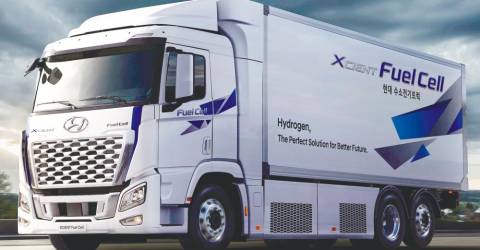EVEN before full electrification with battery electric vehicles (BEVs) has gone mainstream in global markets, some manufacturers are already moving ahead with fuel cell electric vehicles (FCEVs).
Hyundai Motor was among the first with production FCEV passenger models and is steadily growing its hydrogen fuel cell commercial trucks with the Xcient Fuel Cell model.
Fuel cell (FC) technology is particularly well-suited to commercial shipping and logistics due to long ranges and short refuelling times.
The dual-mounted fuel cell system provides enough energy to drive the heavy-duty trucks up and down regions with mountainous terrain.
Hydrogen does not generate carbon dioxide which is known to cause negative climate change. It thus has great potential as a zero-emission energy source for a variety of products.
“Xcient Fuel Cell is a present-day reality, not as a mere future drawing board project. By putting this groundbreaking vehicle on the road now, Hyundai marks a significant milestone in the history of commercial vehicles and the development of hydrogen society,” said In Cheol Lee, executive vice-president and head of commercial vehicle division at Hyundai Motor.
“Building a comprehensive hydrogen ecosystem, where critical transportation needs are met by vehicles like Xcient Fuel Cell, will lead to a paradigm shift that removes automobile emissions from the environmental equation,” he added.
The trucks, manufactured in Korea, are marketed a joint venture company which has Swiss company H2 Energy as a partner.
The Xcient Fuel Cell, the hydrogen FC version of its Xcient truck, is equipped with a 180-kW hydrogen FC system incorporating two 90-kW fuel cell stacks.
With a 350-kW e-motor, the vehicle is claimed to be able to travel 400km on a full tank and requires only 8 to 20 minutes to fill up. Seven large hydrogen tanks offer a combined storage capacity of around 32.09kg of hydrogen.
To date, Hyundai has exported Xcient FC trucks to Switzerland, where it has 23 corporate fleet clients, and more recently, to Germany where 27 units will be used by 7 companies in the logistics and manufacturing sectors.
